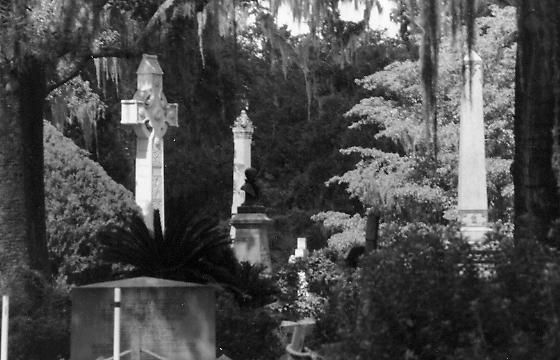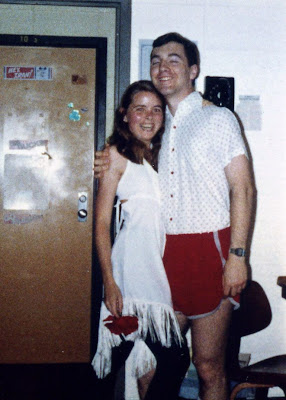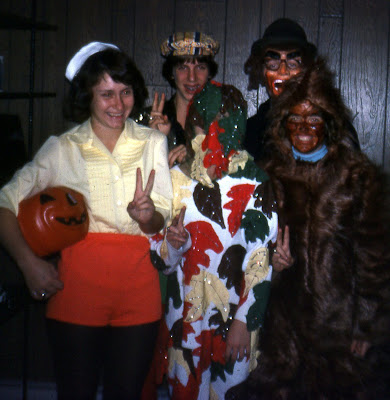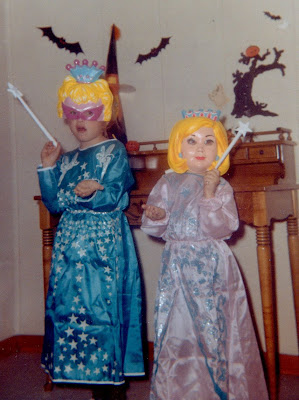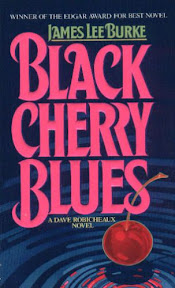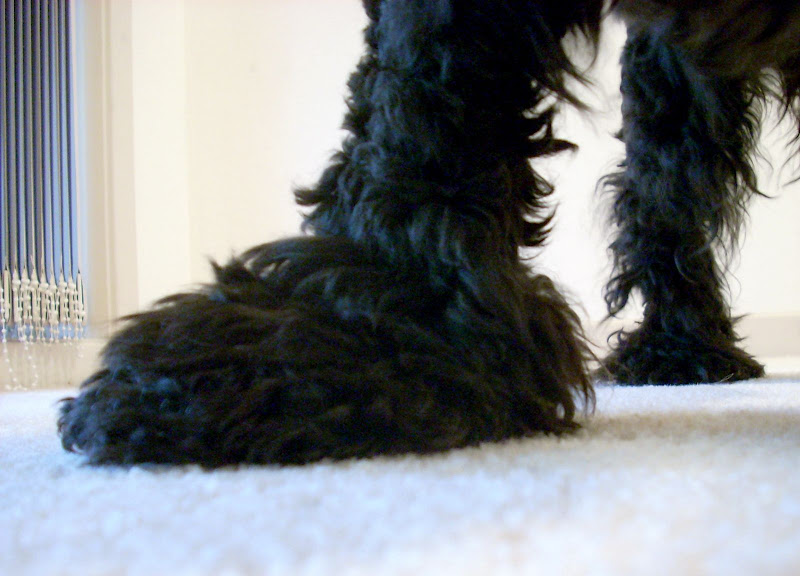Then a breeze springs up and dries the sweat on your face and neck, you wipe your eyes clear on your sleeve, scrub the ball against your thigh, fork your fingers tightly into the stitches, and realize that the score is irrelevant now, that your failure is complete, that it wasn't so bad after all because now you're free and alone in a peculiar way that has put you beyond the obligations of victory and defeat.
This is the first book I'm re-reading or, rather, re-read. (Not ever. But in the context of reading Robicheaux.) I listened to it on tape less than 2 years ago. I remember carrying my "boom box" down to our bedroom in the house on Maundrell Terrace and listening to Dave, Clete, and Dixie Lee. I wondered if I maybe should have just checked it off...
but I'm glad I didn't.
Wow. This is Burke at his best - as I might have guessed seeing that it was for "Black Cherry Blues" that he won the Edgar Award and CWA Macallan Gold Dagger (whatever that last award is. I assume it is British. The copy I have was published by Phoenix Paperback (an imprint of Orion Books of London). I'm going into this detail because - before discussing the novel - I want to discuss the BOOK.
Wow. Obviously Phoenix Paperbacks has a spell check. There were no mis-spelled words. There were interesting phrases, however, like:
... the way billows of fig rolled out of the swamp in the morning...
... we fished for white trout out on the salt, when to crab boils and fish fries...
... it looked as though spring had never touched the land here, as thought this place had been predestined as moonscape...
... I pulled to the side of the road, seat boiling off my face, my windows thick with steam.
That's just a sampling. I've never encountered anything like this before. The book is thick with typos. I've decided to purchase a US copy from Amazon and make a gift of it to the Brisbane Library System. I'm debating about sending a letter to James Burke and Phoenix Paperbacks. (Kevin laughs.)
Now, back to the NOVEL.
I enjoyed reading this even though I already knew the story (sort of. My memory is fast slipping down an ugly slope toward total amnesia.) While listening to the beautiful southern voice of Will Patton reading is magical, I don't appreciate Burke's prose and descriptive passages as thoroughly on tape. I read sitting in a chair. Maybe I'm drinking tea. I listen while driving, while doing dishes, while sorting papers. A lot gets lost in the process.
My "hit list".
- Beautifully written, poetic passages.
I'll never forget that summer, though. Its' the cathedral I sometimes visit when everything else fails, when the heart seems poisoned, the earth stricken, and dead leaves blow across the soul's windows like bits of dried parchment.
- The re-introduction of Clete Purcel who is monumentally contrite and who sincerely loves his friend, Dave.
"Why is it you always make me feel like anthrax, Streak?"
...I walked off toward a group of children with whom Alafair was playing tag. Then Clete called after me, in a voice that made people turn and stare. "I love you anyway, motherfucker."
- Folksy descriptions of people and events. Statements like "the best part of that guy ran down his daddy's leg" and "he's just on of those guys who'll always have his elevator stuck between floors" may seem written to you, but I've known people who talk like this.
- An interesting idea about time and God, if you're inclined to believe in such things.
I made a peculiar prayer. It's a prayer that sometimes I say, one that is perhaps self-serving, but because I believe that God is not limited by time and space as we are, I believe perhaps that He can influence the past even though it has already happened. So sometimes when I'm alone, especially at night, in the dark, and I begin to dwell on the unbearable suffering that people probably experienced before their deaths, I ask God to retroactively relieve their pain, to be with them in mind and body, to numb their senses, to cool whatever flame licked at their eyes in their final moments.
It will probably stick with me in the way that the science fiction story I read years ago about a race who would remove people from planes that were about to crash and replace them with assorted body parts. (I'll have to ask Kevin if he remembers the title of this story.)
-
Nutria. Since we've been collecting words at work, I make a point to write down things I encounter that I don't know. In Burke's books I always find several- including lots of fish and other things he's eating. Like nutria. Which also make some characteristic sound in the bayou - though I haven't been able to find this on line.
- Great bad guys who've done really awful things. (A big hello to Sally Dio! But, sorry man. You are WAY over shadowed by Harry Mapes and Charlie Dodds.)
My criticism.
- Come on, Dave. How is it that you are 50 years old and you've only had 3 significant relationships with women: your mother, your first wife, and Annie (wife #2) and now you're adding to this list Darlene- who you've known for a week at most, been in the company of 3 times, and slept with once??? At, at the end of the book (and of your time in Missoula) you're in love with Tess and think you should have married her? You didn't even kiss her!
But sometimes at dusk, when the farmers burn the sugarcane stubble off their fields and the cinders and smoke lift in the wind and settle on the bayou, when red leaves float in piles past my dock and the air is cold and bittersweet with the smell of burnt sugar, I think of Indians and water people, of voices that can speak through the rain and tease us into yesterday, and in that moment I scoop Alafair up on my shoulders and we gallop down the road through the oaks like horse and rider toward my house, where Batist is barbecuing gaspagoo on the gallery and paper jack-o-lanterns are taped to the lighted windows, and the dragons become as stuffed toys, abandoned and ignored, like the shadows of the heart that one fine morning have gone with the season.

































